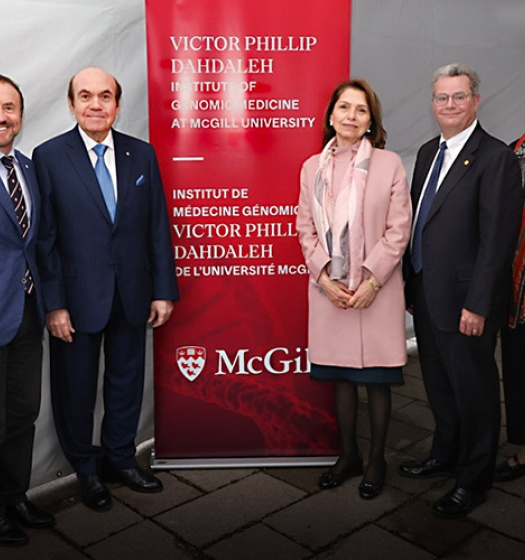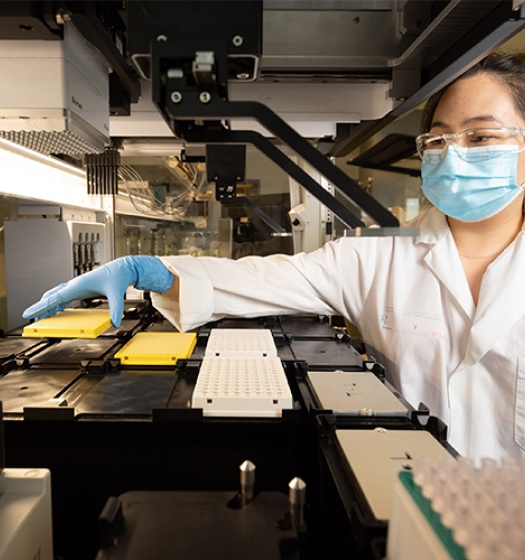During a two-day visit to McGill University in July, alumnus and renowned philanthropist Dr. Victor Dahdaleh met with several members of McGill’s genomics team to learn more about the University’s ambitious vision for its new Institute of Genomic Medicine. He came away from his visit deeply impressed.
“I attended a fantastic presentation with many faculty members, frontline doctors, and researchers who demonstrated that McGill is already well established as one of the biggest genomics centres in the world,” Dahdaleh says. “The whole faculty is at the top of their game, with expertise in bioinformatics, drug development, human genetics, microbiology, cancer genetics, cancer therapeutics. The Institute has established links with hospitals, access to vast data pools, and industry partnerships.
“It was clear to me,” he continues, “that with the correct support and funding for the Institute, McGill would be able to drive the whole field of genomic medicine forward. And it was amazing to hear from some of the doctors about how genomic medicine is helping them fight diseases and cancer in their patients.”
Inspired by McGill’s leadership and the astounding potential of genomic medicine, Dahdaleh and his wife, Mona, made a landmark donation to launch the Victor Phillip Dahdaleh Institute of Genomic Medicine at McGill University.
“With such a great team, brilliant foundations, and a great potential to do good, we were pleased to support this initiative,” says Dahdaleh.
The future of medicine at McGill
McGill has long been a leader in North America in genomics and RNA research. Now, thanks to gifts totalling more than $30 million from the Dahdalehs, the Dahdaleh Institute of Genomic Medicine will be a gamechanger for McGill and the global research community.
“The Victor Phillip Dahdaleh Institute of Genomic Medicine solidifies our international leadership in genomics and RNA research, an area of incredible promise not just in combatting viruses but also in cancer therapeutics,” says Dr. David Eidelman, Vice Principal (Health Affairs) and Dean of the Faculty of Medicine and Health Sciences. “Ultimately, it will be patients and their families who benefit most from the Dahdalehs’ extraordinary gift.”
Indeed, there is seemingly no limit to the role that genomic medicine – which draws on information decoded from all of an individual’s genes to inform their clinical care – can play in tackling the most difficult diseases, from ultra-rare genetic disorders affecting handfuls of people to ubiquitous cancers and infectious diseases like COVID-19 that affect millions worldwide.
“Genomic medicine is a massively exciting and innovative area of research with far-reaching implications for the future of medicine,” says Dahdaleh, who has been a passionate supporter of global health and health-related research for decades. “I feel strongly that genomic medicine is the key to preventing, treating and one day curing many of the diseases that impact lives, families and communities around the world and could accelerate precision medicine, paving the way for individualized therapies, tailored to each person. I’m proud to be a part of this important effort to improve worldwide health.”
By harnessing the interdisciplinary expertise and research infrastructure across McGill’s faculties, the Dahdaleh Institute will propel innovations in genomic medicine that will transform our ability to predict, prevent and treat disease. McGill researchers will lead breakthrough research aimed at developing cutting-edge diagnostic tools, targeted treatments, and new pharmaceuticals and preventative vaccines.
In concert with the Faculty of Medicine and Health Sciences and affiliated hospitals within the McGill University Health Centre, the Dahdaleh Institute will maximize opportunities for clinical interventions in high-priority fields where McGill is already an established leader – such as cancer, neuroscience and mental health, chronic inflammatory diseases, and infectious diseases, including COVID-19.

From left: Vice-Principal (University Advancement) Marc Weinstein, Chancellor John McCall MacBain, Victor Dahdaleh, Mona Dahdaleh, Interim Principal Christopher Manfredi, Vice-Principal (Research and Innovation) Martha Crago, and Vice-Principal (Health Affairs) and Dean of Medicine and Health Sciences David Eidelman.
The Dahdaleh Institute is also one of very few genomics centres in the world that integrates the social sciences as a key pillar of research. Drawing on McGill expertise in law, ethics, public policy and other disciplines, the Dahdaleh Institute will examine the ethical, moral, and legal issues raised by genomics research and its applications, such as the management and administration of genomic data and the penetration of genomic technologies into society.
“I hope the Institute helps accelerate advances in genomic medicine, making it available to all so that in the future we can provide the necessary targeted medicines to prevent diseases, cancers, and allergies from ever developing,” says Dahdaleh. “I hope we can develop vaccines not only for COVID-19 but also for tropical and rare diseases much more quickly and distribute them to those that need them. And I hope we can tackle diseases such as Alzheimer’s and dementia; this would be a huge leap forward for medicine.”
“Dr. Dahdaleh’s objectives – to have a worldwide impact not just academically but on public health – are very close to my heart,” says Mark Lathrop, Director of the Victor Phillip Dahdaleh Institute of Genomic Medicine. “We are very grateful for his leadership and vision.”
A legacy of global impact
For nearly 40 years, Dahdaleh has used his philanthropy as a catalyst for change. His philanthropic achievements have revolved around a few key priorities that he cares deeply about – notably, improving access to education for students from disadvantaged backgrounds and finding innovative solutions to global health challenges.
“Global healthcare, or often the lack of access to it, creates inequalities and, more than that, real harm,” says Dahdaleh. “I have seen how those inequalities can hold back the development of lives of individuals, societies, and even countries. And I am fortunate to be in a position to help.”
Dahdaleh’s investment in genomic medicine at McGill is an extension of his exceptional legacy of supporting innovative global health and health science research in Canada and internationally. He has previously given more than $20 million to establish the Dahdaleh Institute for Global Health Research at his other alma mater, York University in Toronto. He is also a longstanding supporter of the National Heart and Lung Institute at Imperial College London, the British Heart Foundation, and Asthma + Lung UK, where he has contributed to leading-edge research into cardiovascular disease and cancer, including mesothelioma, a cancer of the lungs caused by asbestos exposure.
A great friend of McGill for many years and the University’s largest donor from the UK, Dahdaleh has generously supported important initiatives that align with his philanthropic mission – including the Victor Dahdaleh-Clinton Foundation Scholarship Program, which provides support for 32 disadvantaged students to attend McGill annually, and the Victor Dahdaleh Chair in Neuroscience, which supports McGill’s cutting-edge research in neuroscience.
In addition, for nearly 30 years, McGill’s students have benefitted from his leadership as a trustee of the McGill University Trust, which supports programs and initiatives across McGill, including the McGill University Trust Scholarships for UK students wishing to study at the University.
Training a new generation
A core part of the Dahdaleh Institute’s mission will be to recruit, train, and equip the next generation of world-class researchers, trainees, and students in genomic medicine. The training program will have a particular focus on creating opportunities for students from lower- and middle- income countries, a goal that is especially important to Dahdaleh, who has directed many of his philanthropic efforts toward providing scholarships and training opportunities for disadvantaged students at world-class universities.

The Victor Phillip Dahdaleh Institute of Genomic Medicine will recruit and train students from around the world to be future leaders in genomic medicine.
“No one succeeds without the support of many others,” he says. “If a student has the talent and desire, they should have the opportunity to access the best education. It is not good enough to let a lack of resources get in the way of good educational opportunities.”
Likewise, he adds, the best academic institutions benefit from having a diverse student body. “Diversity and inclusivity bring an added dimension to education and help build cultural understanding.”
An investment in the right place at the right time
Dr. Dahdaleh’s investment is a major – and timely – boon for McGill’s genomics enterprise.
The global COVID-19 pandemic has raised public awareness of genomics on an unprecedented scale, energizing the field and inspiring a broader appreciation for the important role genomics can play in preventing and treating disease.
Indeed, the pandemic is one of the best examples of genomic medicine in action. In less than one year from the onset of the pandemic, the international scientific community managed to sequence the genome of the virus and use that data to develop, test, and manufacture state-of-the-art mRNA vaccines that have saved millions of lives.
The stunning achievement of mRNA vaccines has since sparked new collaborations between the international research community and pharmaceutical industry aimed at leveraging the potential of this biotechnology to tackle today’s most intractable diseases.
“Genomics is transforming the way we think about treating and curing a number of diseases,” says Lathrop. “Our ability to screen individuals or whole populations for susceptibility to certain cancers or rare genetic disorders, for example, will have striking applications for treatment on a world scale. The potential for genomics to contribute to improved health in a global context is exponential.”
Already a cornerstone of Montreal’s vibrant biomanufacturing sector, McGill is deepening its role as a globally competitive engine for the development and testing of new RNA-based therapies by collaborating with industry partners. Earlier this year, McGill became the first (and only) university in Canada to join U.S.-based vaccine developer Moderna’s mRNA Access program, a global research platform that will accelerate the development and expand the impact of mRNA vaccines and medicines for emerging and neglected infectious diseases. Moderna also announced that it will build a state-of-the-art manufacturing facility in the Montreal area to produce made-in-Canada mRNA vaccines, as well as vaccines for influenzas and other illnesses – a decision that will further facilitate collaborations between McGill’s researchers and their partners in the pharmaceutical industry.
Thanks to Dahdaleh’s support, McGill is well positioned to seize these opportunities and to leverage additional funding to amplify the Institute’s scope and impact.
“The work that is already being carried out at McGill is remarkable,” says Dahdaleh. “I hope that my contribution encourages other agencies, individuals, and the government to provide further funding to allow this important work to continue into the future.”
“Dr. Dahdaleh’s gift is absolutely transformative,” says Philippe Gros, Deputy Vice Principal (Research and Innovation) and Executive Director of the Victor Phillip Dahdaleh Institute of Genomic Medicine. “The magnitude of it, the vision behind it, and the local, national, and international impact it will have are tremendous. We are grateful to receive it. And our mission now is to ensure this is not the end, but the beginning of building a really significant program in genomic medicine.”

